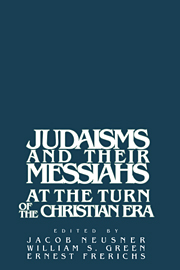Book contents
- Frontmatter
- Contents
- Preface
- List of Contributors
- 1 Introduction: Messiah in Judaism: Rethinking the Question
- 2 Wisdom Makes a Difference: Alternatives to “Messianic” Configurations
- 3 Salvation without and with a Messiah: Developing Beliefs in Writings Ascribed to Enoch
- 4 How the Authors of 1 and 2 Maccabees Treated the “Messianic” Promises
- 5 Messianism in the Maccabean Period
- 6 Waiting for the Messiah: The Spiritual Universe of the Qumran Covenanters
- 7 Philo and Messiah
- 8 Messiah and Gospel
- 9 Christology in Mark's Gospel
- 10 The Question of the Messiah in 4 Ezra
- 11 From Jewish Messianology to Christian Christology: Some Caveats and Perspectives
- 12 Mishnah and Messiah
- General Index
- Index to Biblical and Hermeneutical Texts
3 - Salvation without and with a Messiah: Developing Beliefs in Writings Ascribed to Enoch
Published online by Cambridge University Press: 08 January 2010
- Frontmatter
- Contents
- Preface
- List of Contributors
- 1 Introduction: Messiah in Judaism: Rethinking the Question
- 2 Wisdom Makes a Difference: Alternatives to “Messianic” Configurations
- 3 Salvation without and with a Messiah: Developing Beliefs in Writings Ascribed to Enoch
- 4 How the Authors of 1 and 2 Maccabees Treated the “Messianic” Promises
- 5 Messianism in the Maccabean Period
- 6 Waiting for the Messiah: The Spiritual Universe of the Qumran Covenanters
- 7 Philo and Messiah
- 8 Messiah and Gospel
- 9 Christology in Mark's Gospel
- 10 The Question of the Messiah in 4 Ezra
- 11 From Jewish Messianology to Christian Christology: Some Caveats and Perspectives
- 12 Mishnah and Messiah
- General Index
- Index to Biblical and Hermeneutical Texts
Summary
It is axiomatic in modern biblical studies that variety was a salient feature of early Jewish eschatology. As a probe into this variety, I shall discuss the corpus known as 1 Enoch. In this self-contained body of literature we can trace the development and transformation of certain eschatological traditions over the course of perhaps 350 years. In keeping with the theme of this volume, my focus will be on the Messiah. The topic is not to be taken for granted since this figure is explicitly mentioned only in the latest stratum of the Enochic tradition, the Book of Parables (Chaps. 37–71). My intention, however, is to show how the messianic figure of the Parables assumes functions the earlier strata attribute to other figures.
Dominating the action in the Book of Parables is a transcendent figure, who is the agent of eschatological judgment and salvation. He is known variously as “the Chosen One,” “the Righteous One,” “the Son of Man,” and, on two occasions, “the Anointed One.” In the first part of the paper, I shall take up the themes of judgment and salvation in the earlier strata of 1 Enoch, focusing on the following issues: What are the authors' circumstances? That is, what is the nature of the predicament that calls forth judgment and salvation? Who is the agent of judgment and salvation? What is this agent's relationship to God? What is the specific function of the agent and how does the agent mediate judgment and salvation? Against this background, I shall turn in the second part to the messianic soteriology in the Book of Parables.
- Type
- Chapter
- Information
- Publisher: Cambridge University PressPrint publication year: 1988
- 3
- Cited by



